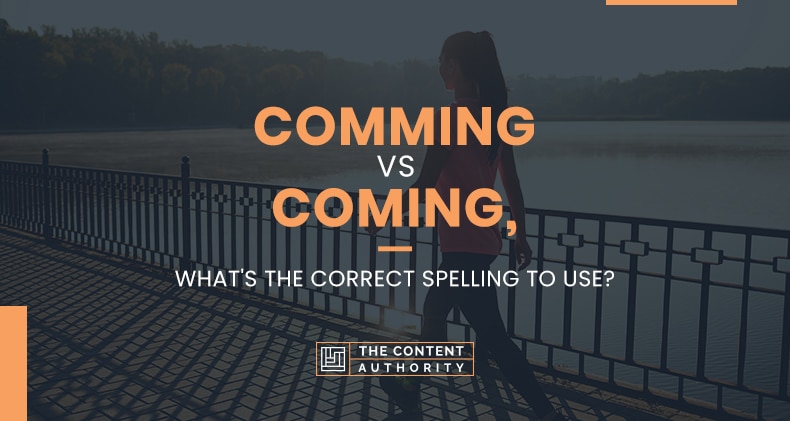Why is it that we always have to double-check online or dictionary the spelling of a word? Understanding that languages evolve and what we use now might not have been the choice two hundred years ago is why we doubt ourselves.
The correct spelling for this word is “coming,” and the reason is simple. When we have a verb that ends in a silent -e, we drop this letter and add the -ing. According to the English grammar rules, in order for this word to be spelled with two m’s, “come” would’ve had to look like “com.”
We are used to seeing so many variations of common words and just end up embracing them all; just don’t make that mistake with this one. Now that we know the correct spelling, when did it all go wrong? Or better yet, when did it start, right? Let me tell you about where it all started.

It Started Before You And Me
The word coming comes from (no pun intended) German origin. In old English, we have “cuman,” from dutch “komen,” and German “kommen.” Like many words we have in our language, the word coming is just a mix of other languages, most of them from the eastern hemisphere.
From middle high German, the word komen (or even less common “cuman) was used to say come, back in the 1500 hundreds. but the replacement or the word that is used nowadays is “come,” or at least since the 1800s it’s become the most frequent one.
English is not a new language; it was brought to the western hemisphere in the 1500s with the colonial settlement. They gave us traditional English, and we turned it into modified English. Then, being such a big country, having so many people, some places hadn’t encountered other groups of people, so they adapted English to their own dialects.
Variants or dialects? You can call it either. In the end, it is just a way to say that just because we speak the same language doesn’t mean we do it the same way. The United States comprises three variants; New England English (people who came from New England), Southern English dialect (people who came from Africa as slaves), and Common American dialect, which is the form of speech used by radio and television.
While standard American English is the most visible dialect of the United States, we still have many others, such as Boston English, New York City English, Appalachian English, and Valley Girl English. We can find most of the differences in the pronunciation, but you can find a lot of spelling differences as well.
What Does Grammar Say About This?
When a verb ends in -e, drop it, and add -ing. is that simple, but we understand that people may not be that into grammar unless they go to school to become a teacher or maybe to study English literature, there’s no reason for anybody to remember that rule.
So far, we’ve been doing great just remembering how to write it, although it is not that easy for most people. There are so many things that we would need to keep in mind that it is entirely acceptable for one of those to slip. And since people could be wondering what other rules they may have forgotten ever existed, let me show what they’ve been missing:
- If a one-syllable verb ends in a vowel+consonant, double the final consonant and add the -ing. eg “run + ing = running”.
- If a verb ends in a vowel + consonant with stress on the last syllable, double the consonant and add the -ing. E.g. “forget + ing = forgetting”
- If a verb ends in -ie, switch the -ie to -y and add the ing. E.g. “die + y + ing = dying”.
Often Confusing Words
It is even worse when we try to write something, and we get it confused with another word. I don’t know how often this happens to others but when I start to write a message, and I’m not sure about a word and unable to check for the spelling, I just change the whole sentence. As opposed to getting caught misspelling something, I’d rather do that.
To show a piece of what I’m talking about, here are some of the words that can be confusing. Most of them used daily:
- affect vs. effect
- all ready vs. already
- a lot vs. alot (alot is not a word)
- between vs. among
- emigrate vs. immigrate
- everyday vs. every day (and all the other indefinite pronouns)
- farther vs. further
- it’s vs. its
- lay vs. lie (my favorite among all)
- would of vs. would have
- they’re vs. there vs. their
Often Misspelled Words
Let’s say people know the exact word they want to use. It’s probably the only one known for what they try to say. They say it every day, which is typical for them; on the other hand, they’ve never needed to write it down, so they are unsure about the spelling. Here there are some of the words anyone can easily misspell. The ones to the left have the correct spelling:
- calendar vs. calender
- tomorrow vs. tommorrow
- disappear vs. dissapperar
- deteriorate vs. deterioreit
- argument vs. arguement
- wednesday vs. wensday
- occurred vs. occured
- queue vs. que
- twelfth vs. twelth
- definitely vs. definately
- noticeable vs. noticable
- convenient vs. convinient
- beginning vs. beggining
- ignore vs. ignor
- opportunity vs. oppertunity
- truly vs. truely
- weird vs. wierd
- leisure vs. liesure
How come it doesn’t get mistaken as often
In general, the great thing about languages is that there’s one word, spelled one way, used for different things. It can even be used in combination with other words, becoming a collocation, phrasal verb, or even an idiom. We have plenty of room to play with.
With the word coming, we can use it as a verb, noun, or adjective. As a noun, it can be used like “an arrival or approach”; as a verb, move or travel towards a place thought of as near or familiar to the speaker; and as an adjective, due to happen or just to begin.
A collocation is a specific arrangement of words that communicates a particular meaning, never literal.
- Come to an end (to stop, to end). I was sad to hear that our vacation was coming to an end.
- Come to a decision (to make a decision). I will be coming to a conclusion about our new manager by EOD.
- Come prepared (to arrive ready beforehand for something specific). I hope you are coming prepared for this meeting; Jackie seems to have a lot to offer.
A phrasal verb combines two to three words from different grammatical categories to form a single meaning.
- Come back (returning to a place). I’m coming back to the place I call home.
- Come out (become known). The truth will be coming out soon; it always does.
- Come forward (volunteer, show oneself). I saw her coming forward to speak up.
An idiom is a form of expression natural or specific to a group of people or language.
- Come down with (to become ill). I feel like I’m coming down with a cold; I don’t feel well.
- Come clean about (to admit something to someone). I was coming clean about the accident when the call dropped.
- Come on board (to join an idea, an organization, or group). She was coming on board and then changed her mind. I don’t know why.
Conclusion
However you choose to use this word is really up to you, but the spelling must be the correct one. Whether you look it up online or in a dictionary app (because, let’s face it, nobody has a paper dictionary anymore), accuracy when writing is key to success.
Shawn Manaher is the founder and CEO of The Content Authority. He’s one part content manager, one part writing ninja organizer, and two parts leader of top content creators. You don’t even want to know what he calls pancakes.


